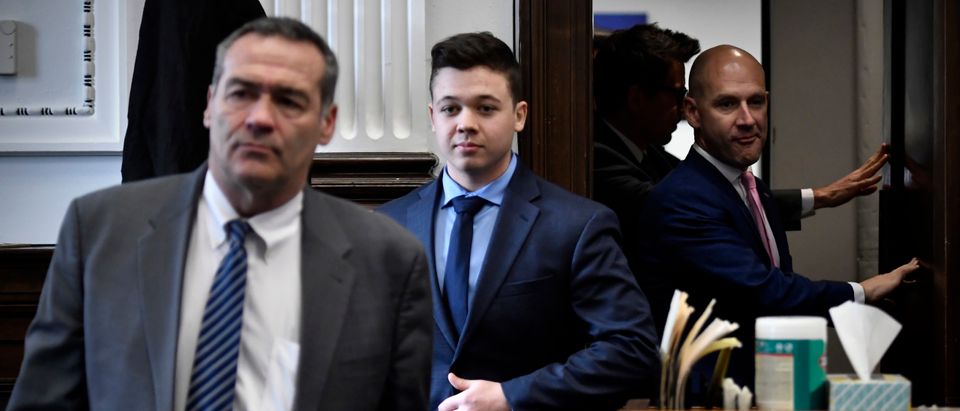Supporters of Kyle Rittenhouse are encouraging him to pursue civil lawsuits against members of the media and Democratic politicians, but legal experts say any defamation or libel cases will be tough for him to fight.
Rittenhouse was acquitted on all charges Friday, including charges that he murdered two men during riots in Kenosha, Wisconsin, last summer. Before and during the case, a large number of politicians, media members and activists referred to Rittenhouse as a “white supremacist” and argued he was a murderer.
Kyle Rittenhouse’s first lawsuit should be filed against the man who called him a white supremacist – Joe Biden.
— toddstarnes (@toddstarnes) November 19, 2021
Despite being cleared of the murder charges, legal experts say Rittenhouse might struggle to win a defamation lawsuit against members of the media. There’s a strong case he is a public figure, meaning a high standard needs to be met to prove defamation, and many of the claims made against him are assertations of opinion, not fact.
“In defamation cases, different standards apply whether you are considered to be a public figure or a private figure,” said Zack Smith, legal fellow at the Meese Center for Legal and Judicial Studies at The Heritage Foundation. “If you’re considered to be a public figure, you have to show that the media outlet or the individual making or repeating the factual statement about you did so with actual malice or reckless disregard. That actual malice standard is very difficult to overcome.”
It’s not entirely clear that Rittenhouse would be considered a public figure in a potential suit, but multiple attorneys who spoke to the Daily Caller said there’s a strong argument due the widespread media attention given to the case and instances where Rittenhouse himself spoke to journalists.
Further complicating the case is whether or not the allegation that someone is a “white supremacist” is provable. Many calls for Rittenhouse to sue have focused on that particular accusation, but experts said it’s primarily one of opinion, not fact.
“The argument would be no one even knows what that means anymore because it’s so ridiculous, so it wouldn’t be an objective provable statement of fact in any way, so it would be a protected opinion,” said Lincoln Bandlow, a California-based media and first amendment lawyer. (RELATED: Watch Kyle Rittenhouse Collapse The Moment Verdict Is Read)
“Defamation only applies to false factual statements. Someone can’t be sued for making, stating an opinion, their opinion about someone,” Smith said. “You would have a stronger case if I said ‘I think John Doe is a white supremacist,’ you’d have a stronger case that that is an opinion than if I said ‘John Doe is a member of the KKK.'”
Even in cases where Rittenhouse was called a murderer, such as in a CBS Mornings tweet that was later corrected, being acquitted on murder charges may not be enough to prove defamation. Because juries do not find innocence, Rittenhouse would have to re-litigate the murder trial over again, experts said.
bang up job, guys. pic.twitter.com/bhQVfYMcpZ
— tsar becket adams (@BecketAdams) November 11, 2021
“I can’t imagine Kyle Rittenhouse wants to live through this again. And basically if he sued people for calling him a murderer, he’d have to prove that’s not an accurate thing to call him,” Bandlow said. “A criminal trial is, you have to prove guilt beyond a reasonable doubt. So a jury could say ‘maybe he was a murderer but I don’t think it was proven sufficiently to me based on this very very high standard, so I’m saying not guilty.’ A criminal jury is not finding innocence.”
As for social media companies which tilted the scales in favor of Rittenhouse’s critics by diminishing speech in his defense and allowing claims that he was a murderer or racist, they likely can’t be held liable either, the lawyers told the Daily Caller. “They have federal immunity under Section 230. There would be no issue of any liability for the social media platforms of the world,” Bandlow asserted.
Some have drawn parallels to the case of Nicholas Sandmann, who settled defamation lawsuits with CNN and The Washington Post for their coverage of his incident at the Lincoln Memorial with fellow students from Covington Catholic High School. But there are key differences between the two cases, including that Sandmann wasn’t a public figure, and much of the media coverage of his case made verifiably false assertions about his conduct.
It still may serve as a useful comparison, though, Smith said: “There are some interesting parallels between this case and the Nicholas Sandmann case … he sued and then settled with a variety of news outlets including the Washington Post … some of the hurdles that Kyle Rittenhouse would have would be some of the same ones that Nicholas Sandmann had.”


